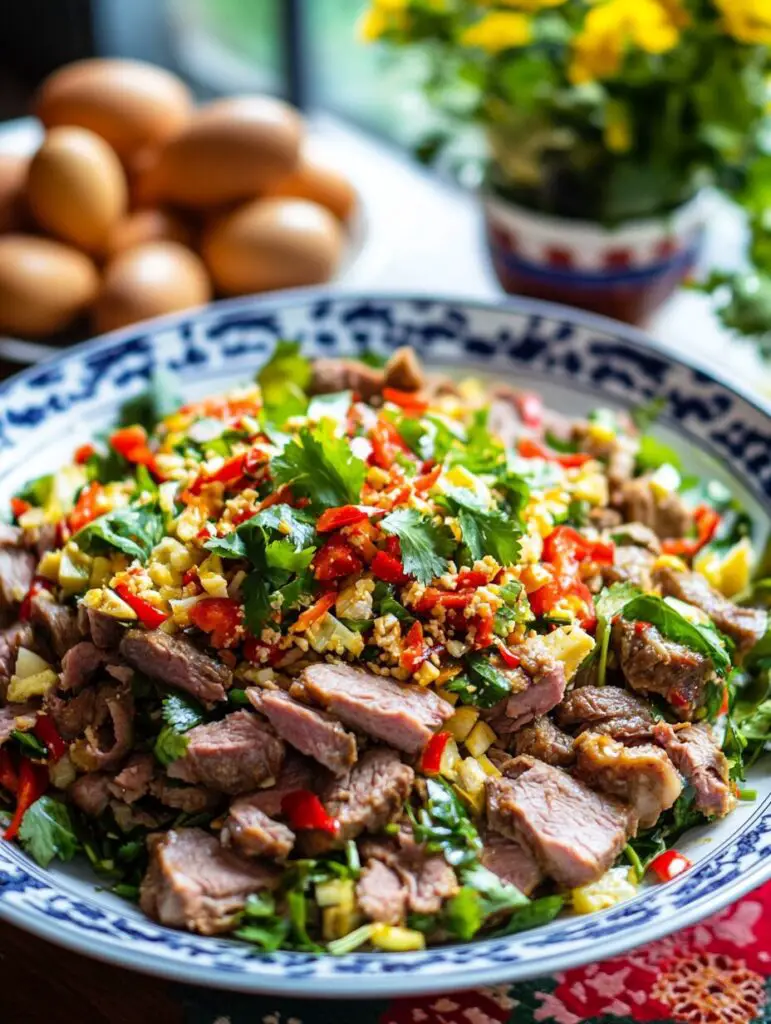Traditional Laotian Meat Salad Recipe: A Cultural and Culinary Journey
Laos is a country rich in cultural heritage and flavor-packed cuisine, and one dish that stands out as both a national treasure and global culinary gem is the Traditional Laotian Meat Salad—commonly known as Larb (also spelled Laab or Lahb). This vibrant, zesty dish is more than just a meal; it’s a representation of Laotian hospitality, community, and culinary ingenuity. In this article, we’ll embark on an in-depth exploration of the Traditional Laotian Meat Salad recipe. We’ll go beyond just instructions and dive into its origins, ingredients, preparation methods, serving suggestions, variations, health benefits, and tips that will help you master this dish like a pro.
What is Larb? Understanding the Traditional Laotian Meat Salad
Larb is the national dish of Laos. It’s a type of minced meat salad traditionally made with pork, chicken, beef, duck, or even fish, mixed with fresh herbs, lime juice, toasted rice powder, and fish sauce. This unique blend of savory, sour, spicy, and aromatic ingredients makes the traditional Laotian meat salad an unforgettable culinary experience.
The word “larb” loosely translates to “luck” or “fortune,” making it a dish often prepared during celebrations and gatherings. It’s served either warm or at room temperature and always accompanied by sticky rice and crisp vegetables.
Origins and Cultural Significance of Laotian Meat Salad
The origins of larb trace back centuries and are deeply embedded in Laotian tradition. It has roots in Isan, the northeastern region of Thailand, where many Laotians reside, but the authentic Laotian version is distinct and less sweet than Thai variations.
Larb is often served at family gatherings, religious ceremonies, weddings, and festivals. The process of making it is communal, with families gathering to prepare meat, roast rice, and chop herbs. This sense of togetherness is reflected in the dish’s bold yet balanced flavor profile.
Ingredients: Building Blocks of Authentic Flavor
To make an authentic traditional Laotian meat salad, you’ll need the following ingredients:
- 1 lb ground meat (pork, chicken, beef, or duck)
- 2 tbsp uncooked sticky rice
- 1 tbsp fish sauce (or to taste)
- 2–3 tbsp lime juice (freshly squeezed)
- 1–2 Thai bird’s eye chilies, finely chopped (adjust to spice level)
- 1/4 cup shallots, thinly sliced
- 1/4 cup chopped green onions
- 1/4 cup fresh mint leaves
- 1/4 cup fresh cilantro leaves
- Optional: kaffir lime leaves, galangal, or lemongrass for aroma
These ingredients are core to crafting a traditional Laotian meat salad recipe that stays true to its roots.
How to Make Toasted Rice Powder: The Secret Ingredient
Toasted rice powder (khao khua) adds a nutty, earthy flavor and a bit of crunch. Here’s how to make it:
- Heat a dry pan over medium heat.
- Add 2 tablespoons of uncooked sticky rice.
- Toast while stirring constantly until golden brown (about 5–7 minutes).
- Let cool, then grind using a mortar and pestle or spice grinder.

Store in an airtight container for up to a month. This step is crucial to achieving the authentic texture of a traditional Laotian meat salad.
Step-by-Step Instructions for Traditional Laotian Meat Salad Recipe
Step 1: Cook the Meat
In a non-stick pan, add ground meat with a few tablespoons of water. Cook over medium heat, stirring to break apart any clumps. Cook just until no longer pink—do not brown the meat.
Step 2: Season
Once the meat is cooked, turn off the heat. Immediately add fish sauce, lime juice, and chopped chilies. Stir well.
Step 3: Add Aromatics and Herbs
Stir in toasted rice powder, shallots, green onions, mint, and cilantro. Mix thoroughly so everything is well distributed.
Step 4: Serve
Serve warm or at room temperature with sticky rice and raw vegetables such as cucumber, cabbage, and lettuce.
Variations on the Traditional Laotian Meat Salad Recipe
While the classic version uses pork or chicken, there are many creative ways to adapt this dish:
- Larb Gai: Made with ground chicken
- Larb Moo: Made with ground pork
- Larb Neua: Made with beef (sliced or ground)
- Larb Ped: Made with duck, often served during special occasions
- Fish Larb: A refreshing version using minced or flaked fish, especially catfish or tilapia
Each variation maintains the essence of the traditional Laotian meat salad while introducing subtle changes in flavor and texture.
How to Serve and Enjoy Traditional Laotian Meat Salad
Serving larb is as much an art as making it. Here are traditional and modern ways to serve it:
- With sticky rice (glutinous rice) rolled into small balls
- Alongside fresh herbs and lettuce wraps
- As a filling in rice paper rolls
- Topped with roasted crushed peanuts for extra texture
- With a side of papaya salad and grilled meat for a complete Laotian meal
Presentation matters too—traditionally, it’s served in shallow bowls or banana leaf trays for an authentic touch.
Health Benefits of Traditional Laotian Meat Salad
This dish is more than delicious—it’s nutritious:
- High in protein from lean meats
- Low in carbs (excluding the rice on the side)
- Rich in herbs that aid digestion and offer antioxidants
- Low in fat especially when using chicken or fish
- Naturally gluten-free
If you’re looking for a clean, flavorful meal, the traditional Laotian meat salad recipe checks all the boxes.
Tips for Making the Perfect Traditional Laotian Meat Salad
- Use fresh herbs for optimal flavor
- Don’t overcook the meat—you want it tender, not dry
- Balance the sauce—taste and adjust lime juice and fish sauce
- Adjust spice level by adding or removing chilies
- Toast rice properly—golden brown, not burnt
These small details make a huge difference when mastering a traditional Laotian meat salad recipe.
Common Mistakes to Avoid
- Using sweet soy sauce instead of fish sauce
- Skipping the toasted rice powder
- Overloading with herbs and overpowering the meat
- Serving it too cold or straight from the fridge
- Forgetting texture: larb is about balance
Avoiding these will help you serve a more authentic and flavorful dish.
FAQs About Traditional Laotian Meat Salad Recipe
Q1: Can I make larb vegetarian?
Yes! Use crumbled tofu or minced mushrooms as a meat alternative.
Q2: Can I prep larb ahead of time?
Yes, but add herbs and lime juice right before serving for freshness.
Q3: What can I use instead of fish sauce?
Soy sauce or tamari for a vegetarian version, though flavor will differ.
Q4: Is larb spicy?
It can be! Adjust chilies to suit your spice tolerance.
Q5: Can kids eat larb?
Absolutely—just reduce or omit the chili content.
Q6: How long does it keep in the fridge?
Up to 2 days. Best served fresh.
Q7: Is larb served hot or cold?
Room temperature or slightly warm is ideal.
Q8: Can I freeze larb?
It’s not recommended as herbs and texture don’t hold up well.
Q9: What’s the difference between Laotian and Thai larb?
Thai versions may include sugar and cooked garlic; Laotian larb is more herbaceous and pure.
Q10: What wine or drink pairs with larb?
Try dry Riesling, light lager, or Thai iced tea.
Final Thoughts on the Traditional Laotian Meat Salad Recipe
The traditional Laotian meat salad recipe is more than just a flavorful dish—it’s a vibrant expression of Laotian identity, community, and balance. Whether you stick to the classic pork version or explore variations with duck or fish, each bite offers a burst of freshness, spice, and cultural richness. By understanding the ingredients, preparation, and history behind larb, you’re not just cooking—you’re participating in a centuries-old tradition. So grab your mortar and pestle, gather fresh herbs, and get ready to experience one of Southeast Asia’s most iconic dishes in your own kitchen. Happy cooking!
Print
Traditional Laotian Meat Salad Recipe: A Journey into Larb’s Rich Flavors
- Total Time: 30 minutes
- Yield: 4 portions
Ingredients
1 lb (450g) ground meat (chicken, beef, or duck)
2 tbsp uncooked sticky rice
1 tbsp fish sauce (or to taste)
2–3 tbsp fresh lime juice
1–2 Thai bird’s eye chilies, finely chopped (adjust to taste)
1/4 cup shallots, thinly sliced
1/4 cup green onions, chopped
1/4 cup fresh mint leaves
1/4 cup fresh cilantro leaves
Optional: kaffir lime leaves, galangal, or lemongrass (for aroma)
Instructions
-
Prepare toasted rice powder
-
In a dry pan over medium heat, toast the sticky rice until golden brown (5–7 minutes).
-
Let cool and grind into a coarse powder using a spice grinder or mortar and pestle. Set aside.
-
-
Cook the meat
-
In a non-stick skillet, cook the ground meat with a splash of water over medium heat.
-
Stir constantly to break up clumps. Cook until just done (do not brown). Remove from heat.
-
-
Season
-
While the meat is still warm, mix in fish sauce, lime juice, and chopped chilies. Stir well.
-
-
Add aromatics and herbs
-
Mix in toasted rice powder, shallots, green onions, mint, and cilantro. Toss everything together.
-
-
Serve
-
Serve warm or at room temperature with sticky rice and fresh vegetables like cucumber, cabbage, or lettuce.
-
Notes
-
Don’t skip the toasted rice powder – it adds signature texture and nuttiness.
-
Cook meat gently – browing is not traditional and can dry it out.
-
Adjust to taste – balance lime juice and fish sauce based on your preference.
-
Use fresh herbs – they bring brightness and authenticity.
- Prep Time: 20minutes
- Cook Time: 10minutes


